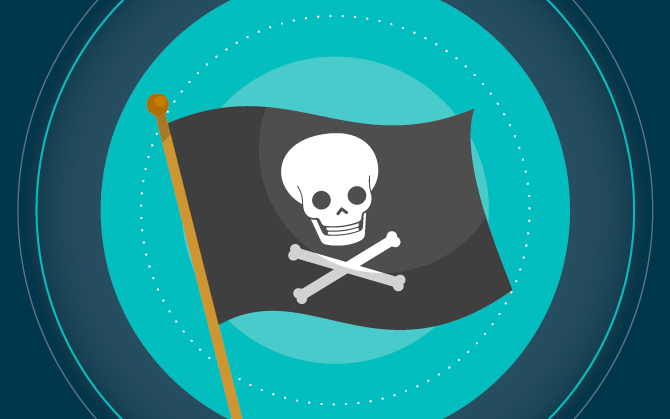
Understand the concept of digital piracy and learn how to protect yourself
Myths and truths about digital piracy.

What will we see in this post
Digital piracy is a major and constant danger for those working with audio, audiovisual, written or educational content.
For businesses, it represents a greater risk; after all, information leaks are frequent and may cause damage to the reputation of companies.
But the risks of piracy go beyond damages caused to end customers, who purchase an illicitly used or counterfeit product. Any institution may also be negatively affected in various ways, especially with a drop in sales and with the negative perception regarding the products.
With this in mind, we’ve prepared this post to explain a bit more about the concept of digital piracy and to give you a few tips on how to protect yourself from it.
The concept of digital piracy
Piracy relates to the practice of copying, selling or reproducing products without the permission of its developers or owners.
This process occurs on the internet, where a digital copy can be offered as a free download or by means of selling it a price well below average.
Piracy is a crime on both sides: those who distribute the product and also those who sell it.
As you know, the internet is an extremely broad environment, and therefore, it’s also very difficult to control the sharing of data and information. In order to avoid problems, the use of security tools is recommended.
Digital piracy around the world
Digital piracy raises concerns all over the world. A 2005 study for the Motion Picture Association of America (MPAA), states that ‘Piracy is the biggest threat to the U.S. motion picture industry’ and claims that in 2005 US studios may have lost about USD 6.1 billion due to digital piracy.
Moreover, according to Statistica, the US had more than 17 billion visits to piracy sites in 2018, the highest number among all countries, followed by Russia and Brazil.
Despite the fact that digital piracy impacts mostly large companies, it also affects smaller content producers and those who effectively work with the production, promotion, and distribution of the material.
A pirated book, for example, causes damages to the author, the publisher, the bookseller, translators and everyone involved in the process. In addition, readers can also be hurt by this practice; after all, piracy does not offer reliable copies.
Protecting videos on the internet
There are different ways to protect videos on the internet, such as using good antivirus software or VPN software. But, in addition, there are other recommended practices and we’re going to talk a little about each one of them:
Adopt and practice a security policy in your business
If you work with other people, it’s important that you adopt a security policy in your business to prevent employees from downloading questionable or illegal content, which may open gaps in the system and allow a hacker attack.
Password protect your videos
Several platforms already ensure this functionality, such as Hotmart, for example.
In cases of video content sales, it is possible to release passwords only to users who have paid for the product. This prevents other people from having illegal access to the website.
Use data encryption
If you want to protect your videos against unauthorized downloading, another option is doing so by encrypting the content. With it, all videos that you upload onto the network will be specially coded for your content or website consumption environment.
If a person manages to download a video, they won’t be able to play it because of this encryption. Good tip, wouldn’t you agree?
Protect your video by domain
This way you can set on which domain you want your videos to be shown. This means that, even if someone manages to download the videos, they won’t be able to resell or distribute them, since they’ll only work on the set domain.
Have a security token
With a security token, all videos shown will have a security key linked to the URL where they are being shown. This key expires as soon as users finish watching the content.
Although other people can obtain the URL for direct access, they won’t be able to view the video, since the key will no longer work.
Myths and truths about internet piracy
The fact that digital piracy must be fought is pretty much unanimously accepted. Anyway, what is true and what is myth regarding this subject? Check it out!
Copying and owning CD audios and DVD movies is a crime
Myth!
Piracy entails the distribution, copying or use of work by people who don’t have a license to do so.
This way, from the moment you legally purchase an original CD or DVD, you are also purchasing the license to use and reproduce the product privately.
Using pirated programs increases the chances of your computer being infected by a virus
True!
Using programs downloaded illegally and without information about the source is a great opportunity for malicious people to insert a virus into your device.
The tip here is to always choose to install original programs, which are a lot more difficult to be hacked.
Digital piracy harms businesses and the economy as a whole
True!
Once work is pirated, not only the author is hurt, but also everyone involved in its production and sale.
In addition, piracy can hurt businesses by devaluing certain content that was the specialty of the producer.
Using torrents and P2P programs is illegal
Myth!
These are programs that represent a decentralized technology for the transfer of files between computers, which operate on internet TCP/IP protocols.
Therefore, there is no piracy involved, quite the contrary. The P2P technology broadens internet users’ horizons, creating a free pass for knowledge of other effective and original information.
Nowadays, many companies work with this technology model with the purpose of facilitating communication in their business and the collective work with the use of computers.
The big problem happens when users offer or distribute work to web users through these programs, without owning the copyrights to do so.
Hacking a DVD’s region protection code is illegal
Myth!
The DVD region protection code is a technical limitation requested by the music industry aiming to establish specific regional zones for each disc. This prevents transfers from one region to another.
It’s merely a technical procedure without any legal protection.
Read and learn more
Well, now that you know a little more about digital piracy and video protection, you can prevent your business from suffering losses.
So, how about starting to protect your products and content?
If you have any questions, leave us a comment below!




